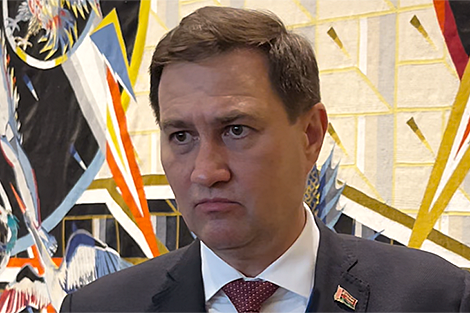Opinions & Interviews
Ryzhenkov reveals Belarus' main response to sanctions

Screenshot of the video
MINSK, 29 September (BelTA) – Belarusian Minister of Foreign Affairs Maksim Ryzhenkov, who is in New York to participate in UN events, told Belarusian media about Belarus' main response to sanctions, BelTA has learned.
The foreign minister noted that the topic of illegal unilateral sanctions was raised during all negotiations with his counterparts from different countries. They were on the same page on this issue. This topic was articulated very clearly in Maksim Ryzhenkov's speeches at various UN venues.
“Sanctions are aimed at curbing the development of states, preventing them from accessing material resources and technologies, they affect the movement of people. We have said that U.S. and EU sanctions today affect about 40 countries with a population of about 2.5 billion. Of course, a great number of countries got together to push against sanctions at all international venues, in a bilateral format,” said Maksim Ryzhenkov.
Answering BelTA's question about the possibilities of legal protection of Belarus' interests in international courts, the foreign minister said: “We are indeed working on documents to seek legal protection of our rights. But this is a long shot. The key response to all these sanctions is to open up more, as we did by introducing the visa waiver for citizens of the European Union: come, see how we are developing, what is happening here, and spend time here.”
According to the foreign minister, the second way to respond to illegal sanctions is to strengthen unity within various international organizations where the voice of Belarus is heard. Among them are the SCO, BRICS, the EAEU, and the CIS.
“In other words, our common response is strengthening the Global Majority. This includes even those who have not been affected by sanctions yet. Why I am saying 'yet'? Because the West will not survive without sanctions. They need to strangle and restrain the development of all states. This is the only way for them to survive today, they are used to always living at someone else's expense. Therefore, our response is our unity, joint projects and strengthening of the institutional foundations of those organizations that we are a part of today,” the minister added.







 print version
print version make home page
make home page add to bookmarks
add to bookmarks

